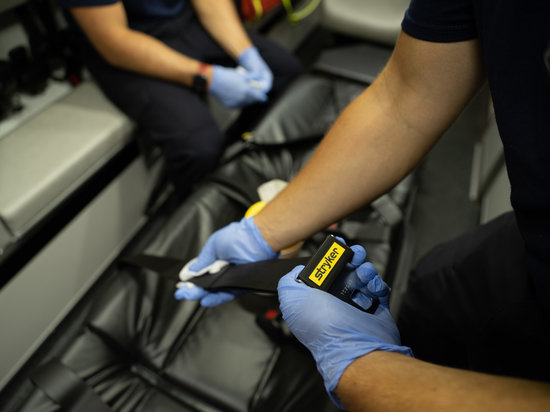
#Product Trends
Enhance your caregiver safety
LUCAS provides an extra pair of hands.
Resuscitation of cardiac arrest patients affected by an infectious disease could compromise caregiver safety. The LUCAS chest compression system could help by minimizing the amount of contact between the caregiver and patient. LUCAS provides an extra pair of hands allowing paramedics to maintain distance and focus on treating the underlying cause.
Reduce proximity to patient
Manual CPR may be a possible transmission route of COVID-19, as breathing in close proximity to the airway of the patient during an aerobic activity may increase transmission to healthcare professionals.
“The increased transmission of SARS-CoV to healthcare workers previously reported during cardiopulmonary resuscitation (CPR) was likely due to virus aerosolisation during BVM ventilation.”
Minimize staff exposure
When managing suspected and confirmed cases of COVID-19, “The number of individual staff members involved in the resuscitation should be kept to a minimum with no or minimal exchange of staff for the duration of the case, if possible.”
• The European resuscitation council interim guidelines on COVID-19 patients recommends where there is a need for prolonged CPR, to consider the use of a mechanical chest compression device for those settings that are familiar with its use.
• The Canadian Cardiovascular Society states: "Limit healthcare providers exposure during cardiac arrests involving known or suspected COVID-19...consider mCPR device such as LUCAS."
• The American Heart Association has incorporated the consideration for mechanical CPR into their ACLS Cardiac Arrest Algorithm for Suspected or Confirmed COVID-19 Patients.
Resources:
1. European Resuscitation Council COVID-19 Guidelines
2. Canadian Cardiovascular Society. Guidance from the CCS COVID-19 Rapid Response Team.
3. Edelson et al. Interim Guidance for Basic and Advanced Life Support in Adults, Children, and Neonates With Suspected or Confirmed COVID-19: From the Emergency Cardiovascular Care Committee and Get With the Guidelines®-Resuscitation Adult and Pediatric Task Forces of the American Heart Association in Collaboration with the American Academy of Pediatrics, American Association for Respiratory Care, American College of Emergency Physicians, The Society of Critical Care Anesthesiologists, and American Society of Anesthesiologists: Supporting Organizations: American Association of Critical Care Nurses and National EMS Physicians. Circulation 2020
4. Ling L, et al. COVID-19: A critical care perspective informed by lessons learnt from other viralepidemics. Anaesth Crit Care Pain Med (2020)
5. Peng WHP et al. Outbreak of a new coronavirus: what anaesthetists should know. British Journal of Anaesthesia 2020 May;124(5):497-






